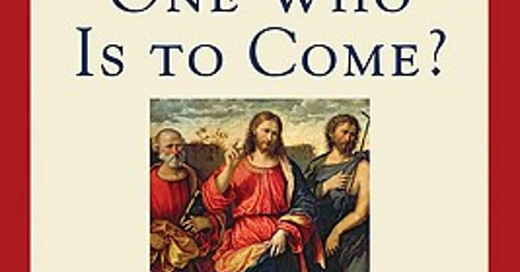Book # 6 was another more academic book, this time trying to answer the question: Did the historical Jesus claim to be the Messiah? Hence the title drawn from Matt 11:3 and Luke 7:19. Are You the One Who is to Come? The Historical Jesus and the Messianic Question, originally published by Hendrickson, but taken over by Baker, first came out in 2009.
You might find it hard to believe, but many scholars argue that Jesus never claimed to be the Messiah. He was just a prophet, rabbi, or healer, who maybe excited messianic hopes, but did not claim to be the Messiah. Many argue that Jesus was heralded as the Messiah only after the resurrection. The logic being, the resurrection made Jesus a “somebody” and “Messiah” was a good title to give to a “somebody.” So he was only proclaimed as the Messiah after his resurrection.
I attempt to dismantle the dogmatic idea of a non-messianic Jesus, building on the work of others before me like Martin Hengel and N.T. Wright.
First, I give a brief survey of ancient sources showing that messianic beliefs were not universal and among those Jewish authors who believed in a coming Messiah, beliefs about said Messiah were diverse and far from monolithic. Along the way, I also tackle the question of whether there is actually any messianic figure, besides the Persian King Cyrus in Isaiah 45, in the Old Testament. I say, “yes,” because messianism is basically Davidic dynasty plus eschatology.
Next, I argue that “raised from the dead” does not necessarily equal “Messiah.” The two witnesses in the Book of Revelation come back to life but that did not make either of them a Messiah (Revelation 11). Lazarus was raised back to life, but peeps didn’t go around calling him the Messiah after that (John 11). So the acclamation of Jesus as Messiah must have existed before Easter!
Using the historical-critical tools of the historical Jesus guild I advocated that the messianic faith of the early church did not combust into existence from nothing as people tried to figure out great titles to lavish upon their fallen leader. True, Jesus did not go around flying a banner saying, ‘Hey, I’m the Messiah, please drizzle some oil on my head because I’ve like totally got the anointing from God.’ But if you proclaim the kingdom of God, imply that you’re the king of that kingdom, declare that the day of national restoration is dawning, compare yourself to David and Solomon, perform what various people considered to be signs of messianic deliverance, enter Jerusalem on a donkey with people shouting ‘Hosanna to the Son of David’, and end up on trial on a messianic charge and mocked in death as a Judeanking, well, you don’t need a PhD in rabbinic literature to see what was going on here. Jesus deliberately acted out a messianic role, and it was this motif to his ministry that explained why the church began and why it took the shape that it did.
The resurrection certainly brought about a transformation for many of his followers. The resurrection turned the debris of a messianic failure into a messianic victory that inaugurated a messianic kingdom. Still, resurrection alone, some kind of cognitive dissonance, or supposed sociological models, cannot adequately account for the emergence of the church as a messianic movement or for the veneration of Jesus as ‘Lord and Messiah’ if Jesus never gave cause for thinking so. Oscar Cullmann put it wonderfully when he said: ‘The early church believed in Christ’s messiahship only because it believed that Jesus believed himself to be the Messiah.’
I think I put together a pretty tight and solid argument for my position, reviews were pretty positive, so it’s been immensely depressing that everyone whose been writing on messianism since 2009 has basically ignored it. Alas!





Alas indeed. Thank you for a good and thoughtful article.
You have built an excellent scaffold in this article convincingly arguing for Christ as the Messiah and the early church's belief in Christ as Lord and Messiah. Thank you!